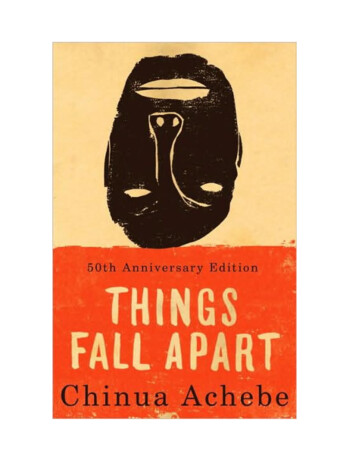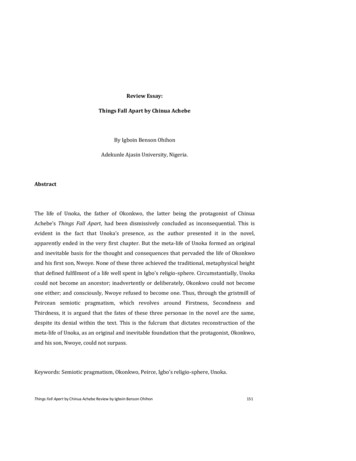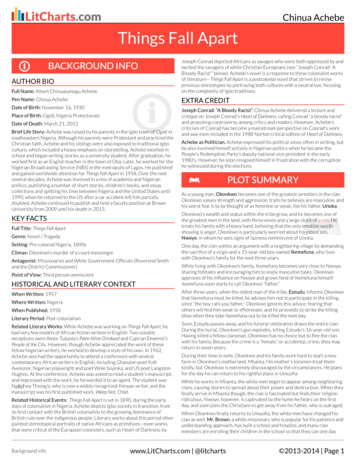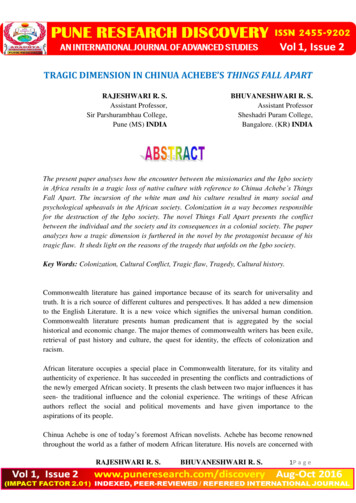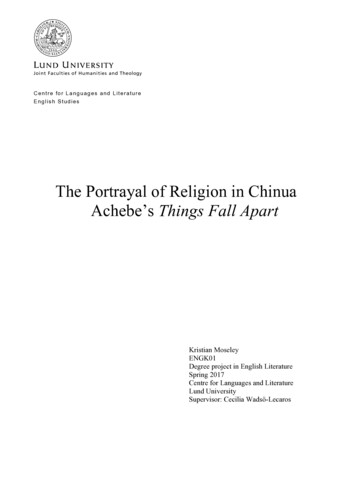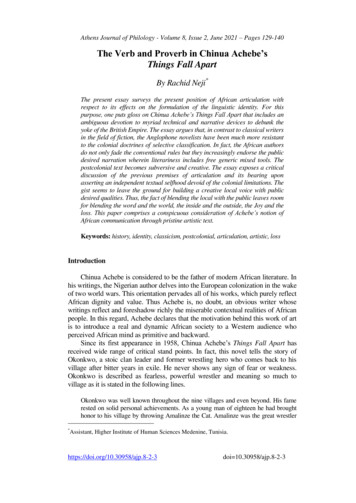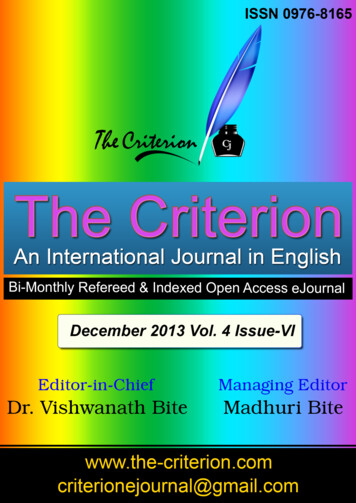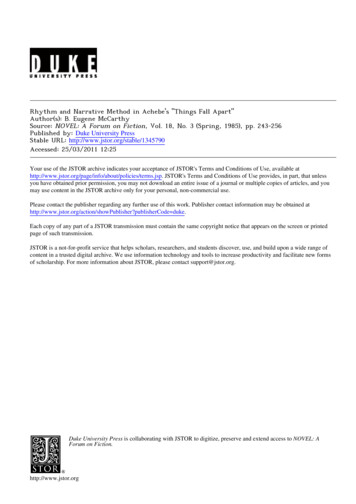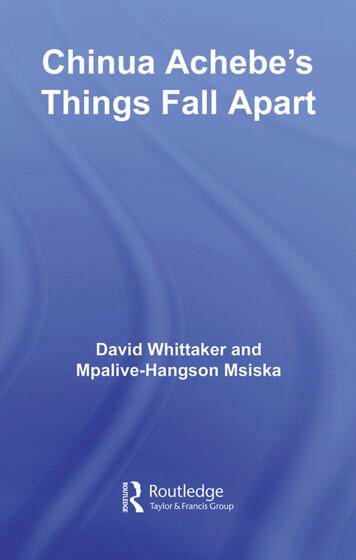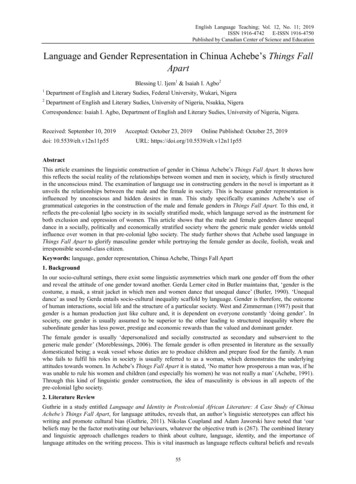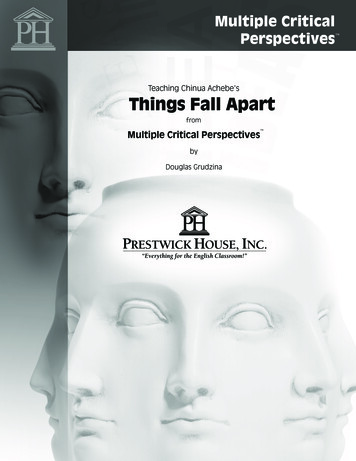
Transcription
Multiple CriticalPerspectivesTeaching Chinua Achebe'sThings Fall ApartfromMultiple Critical PerspectivesbyDouglas Grudzina
Multiple CriticalPerspectivesThings Fall ApartGeneral Introduction to the WorkChinua Achebe: The Author and His WorkThingsFall Apart was published in 1959, the first novel by a young Nigerian writer, Chinua Achebe.He has since published numerous novels, poems, and other works and has become an acclaimedvoice in African literature. This novel, which he was hesitant to publish at the outset, is now consideredthe seminal novel about Africa by an African—the first modern African novel. It has been translated intodozens of languages from its original English.Achebe was born in 1930 in Ogidi in eastern Nigeria, in what was then a British colony. The son ofChristian parents of the Ibo ethnic group, he was educated at schools developed and run by the British.He learned English as a child and read classic English writers such as Charles Dickens and Robert LouisStevenson. Early on, he absorbed the stereotypical European view of Africans in literature as primitive anduncultured, but he eventually came to realize that what he was reading did not reflect African culture ashe knew it to be. After graduating from University in 1954, Achebe worked for the Nigerian BroadcastingCorp. and began his writing career.In an essay on Achebe, the late John Povey of UCLA, founder of The John Povey Centre for the Studyof English in Southern Africa, quotes Achebe: “First I had to tell Europe that the arrogance on which shesought to excuse her pillage of Africa, i.e., that Africa was the Primordial Void, was sheer humbug; thatAfrica had a history, a religion, a civilization. . Actually it was not to Europe alone that I spoke. I spokealso to that part of ourselves that had come to accept Europe’s opinion of us,” ua). His fiction was deeply entwined with his political views as Nigeria gainedindependence from Britain in 1960 and moved toward civil war. The Ibo attempted to form their ownnation of Biafra in 1967 and Achebe served as Biafra’s ambassador. After a bloody war, the effort collapsedin 1970. Achebe continued writing and teaching.Achebe came to the U.S. in 1972 to teach English at the University of Massachusetts at Amherst. Hereturned to the University of Nigeria in 1976 and continued to write and publish novels. A car accident in1990 left him confined to a wheelchair with spinal damage and precipitated a return to the U.S., where heteaches at Bard College in New York. He won the prestigious Man Booker International Prize for literaturein 2007.6Pr e s t w i c kHo u s e,In c.
Things Fall ApartMultiple CriticalPerspectivesNew Historicism Appliedto Things Fall ApartNotes on New HistoricismAcommon tendency in the studyof literature written in, and/orset in, a past or foreign culture is to assume a direct comparisonbetween the culture as presented in the text and as it really was/is.New Historicism asserts that such a comparison is impossible fortwo basic reasons.First, the “truth” of a foreign or past culture can never be knownas established and unchangeable. At best, any understanding of the“truth” is a matter of interpretation on the parts of both the writerand the reader. This is most blatantly evident in the fact that the “losers” of history hardly ever get heard. The culture that is dominatedby another is often lost to history because it is the powerful whohave the resources to record that history. Even in recent past events,who really knows both sides of the story? Who really knows thewhole of the Nazi story? Or the Iraqi story? New Historicists arguethat these unknown histories are just as significant as the histories ofthe dominant culture of power and should be included in any worldview. Since they often contradict “traditional” (i.e., the winner’s) history, there is no way to really know the absolute truth.Second, while the text under consideration does indeed reflectthe culture in which it was written (and to some degree in whichit is set), it also participates in the culture in which it is written.In other words, its very existence changes the culture it “reflects.”To New Historicists, literature and culture are born of one another.For example, although Harper Lee’s To Kill a Mockingbird certainlyreflected the culture of the South during the mid-20th century, it alsobecame a tool to raise awareness of, and change certain elements of,that culture.Pr e s t w i c kHo u s e,In c.13
Things Fall ApartMultiple CriticalPerspectivesActivity OnePlacing Things Fall Apart into A Historical Context1. Copy and distribute the handouts: Things Fall Apart: New Historicist Activity One Timeline and Placingthe Events of Things Fall Apart into a Historical Context.2.Assign students to pairs or small groups.3.Have each group examine the timeline and the novel.4. Then have them speculate when certain key plot events in the novel probably took place. In the spacesprovided, have them state the evidence from the timeline on which they are basing their speculation.NOTE: Emphasize to students that they have neither time nor room to try to place every discrete plot event onthe chart, but if they can infer from the novel and the timeline, for instance, that Hugh Clifford’s term as colonialgovernor began during Okonkwo’s exile, then they can hypothesize that that exile began c. 1916 - 1917.5.Reconvene the class and allow each pair or small group to report its findings.6.Discuss any key discrepancies.NOTE: Students do not need to agree or even come to consensus, unless the discrepancy is the result of a blatantmisread of either the novel or the timeline.7. Discuss any significant problems (for example, are there instances in which the chronological orderof the novel seems to contradict the chronology of events on the time sheet?).8.As a class, discuss the following questions: How intentional is Achebe in creating a historical background for his novel? How closely aligned is the novel to actual movements and events? What kind of view of historical events beyond Umuofia do we get from the novel? Does Achebe’s purpose seem more to report or persuade? Why do you think that? How effective is he in achieving his purpose? Why? What evidence is there in the novel that Achebe was writing primarily for a European audience?Pr e s t w i c kHo u s e,In c.17
Things Fall ApartMultiple CriticalPerspectivesFeminist Theory Appliedto Things Fall ApartNotes on the Feminist TheoryFeminism is an evolving philosophy, and its application in literatureis a relatively new area of study. The basis of the movement, both inliterature and society, is that the Western world is fundamentally patriarchal (i.e., created by men, ruled by men, viewed through the eyes ofmen, and judged by men).In the 1960s, the feminist movement began to form a new approachto literary criticism. Of course, women had already been writing andpublishing for centuries, but the 1960s saw the rise of a feminist literarytheory. Until then, the works of female writers (or works about females)were examined by the same standards as those by male writers (andabout men). Women were thought to be less intelligent than men, atleast in part because they generally received less formal education, andmany women accepted that judgment. It was not until the feministmovement was well under way that women began examining old texts,reevaluating the portrayal of women in literature, and writing newworks to fit the developing concept of the “modern woman.”The feminist approach is based on finding and exposing suggestionsof misogyny (negative attitudes toward women) in literature. Feministsare interested in exposing the undervaluing of women in literature thathas long been accepted as the norm by both men and women. Theyhave even dissected many words in Western languages that reflect apatriarchal worldview. Arguing that the past millennia in the West havebeen dominated by men—whether the politicians in power or the historians recording it all—feminist critics believe that Western literaturereflects a masculine bias, and, consequently, represents an inaccurateand potentially harmful image of women. In order to repair this imageand achieve balance, they insist that works by and about women beadded to the literary canon and read from a feminist perspective.Pr e s t w i c kHo u s e,In c.45
Things Fall ApartMultiple CriticalPerspectivesActivity OneExamining the Portrayal of Women in the Novel1.As a class, identify the most notable female characters in the book (e.g., Ekwefi, Ezinma, etc.)2. Still in full-class discussion, list the various social and cultural roles filled by women in the novel(e.g., nurture the young, serve as priestess/oracle, etc.).3.Divide the class into an even number of groups.4. Assign half of the groups (or allow them to choose) to examine the book for evidence of a positiveattitude toward women. The other half will examine the book for evidence of a negative attitudetoward women.5.Reconvene the class and allow each group to report its findings.6. As a class, discuss whether Things Fall Apart presents generally a positive or misogynistic portrayalof women. Does the novel’s portrayal of women reflect more the society about which Achebe has written orAchebe’s own attitudes and values? Why?NOTE: Students do not need to agree or come to consensus. The point is for them simply to examine the issue.Pr e s t w i c kHo u s e,In c.49
Things Fall ApartMultiple CriticalPerspectivesMythological/Archetypal CriticismApplied to Things Fall ApartNotes on the Mythological/Archetypal ApproachMythological, archetypal, and psychological criticism are allclosely related. This is because Freud formulated many theories around the idea of the social archetype, and his pupil, Carl Jung,expanded and refined Freud’s theories into a more cross-culturalphilosophy.Critics who examine texts from a mythological/archetypalstandpoint are looking for symbols. Jung said that an archetype is “afigure.that repeats itself in the course of history wherever creativefantasy is fully manifested.” He believed that human beings wereborn with an innate knowledge of certain archetypes. The evidenceof this, Jung claimed, lies in the fact that some myths are repeatedthroughout history in cultures and eras that could not possibly havehad any contact with one another. Many stories in Greek and Romanmythology have counterparts in Chinese and Celtic mythology, longbefore the Greek and Roman Empires spread to Asia and northernEurope. Most of the myths and symbols represent ideas that humanbeings could not otherwise explain (the origins of life, what happensafter death, etc.). Every culture has a creation story, a-life-after-deathbelief, and a reason for human failings, and these stories—whenstudied comparatively—are far more similar than different.When looking for archetypes or myths, critics take note of general themes, characters, and situations that recur in literature andmyth. In modern times, traditional literary and mythological archetypes are successfully translated to film. For example, Jane Austen’sEmma was adapted into the popular Hollywood film Clueless. Bydrawing on those feelings, thoughts, concerns, and issues that havebeen a part of the human condition in every generation, modernauthors allow readers to feel that they know the characters in a workwith very little background information. Imagine how cluttered stories would be if the author had to give every detail about every singleminor character that entered the work!Pr e s t w i c kHo u s e,In c.55
Multiple CriticalPerspectivesThings Fall ApartActivity OneExamining Okonkwo’s Exile as the Quest1. Copy and distribute the handouts: Things Fall Apart: Archetypal Activity One: Information Sheet andThings Fall Apart Archetypal Activity One: Graphic.2. Have students, either individually or in pairs, consider Okonkwo’s exile, the events surrounding it,and its aftermath and complete the graphic to indicate which events and characters correspond tothe elements of the hero’s quest.3.Reconvene the class and have groups report their findings.4. As a class, discuss how students have compared Okonkwo’s exile to a quest, and then discuss thefollowing questions: What motivates Okonkwo’s exile (both the physical reason and any emotional, psychological, and/or spiritual factors that may be seen to have contributed to it)? What is the archetypal significance of the family’s journey to Okonkwo’s Motherland? What is significant about Okonkwo’s reaction to his exile? Does Okonkwo ever grow or changefrom his initial reaction? What is the ultimate result of Okonkwo’s exile? Why is this significant? Given Okonkwo’s nature and the events surrounding his exile, can Okonkwo be considered a typeof Hero? Why or why not?62Pr e s t w i c kHo u s e,In c.
Perspectives Things Fall Apart General Introduction to the Work Chinua Achebe: The Author and His Work T hings Fall apa rt w a s P ublis H ed in 1959, the first novel by a young Nigerian writer, Chinua Achebe. He has since published numerous novels, poems, and other works
